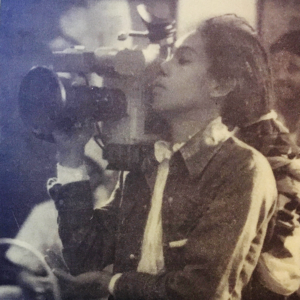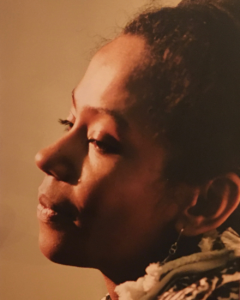



For the first event on The Cinema Of Ideas we’ll be joined by curator & researcher Aleema Gray, alongside Rasheda Ashanti Malcolm and June Givanni for a conversation on the experiences of Rastafari women in Britain through an exploration of the Rastafari archive and D. Elmina Davis’ groundbreaking 1988 film Omega Rising Women of Rastafari (streaming to accompany the live event from 19 Aug-2 Sept).
In this blog, ahead of the event on 26 August, Aleema reflects on her own research into the history of the Rastafari movement and the importance of recording and reinterpreting archival material in reclaiming one’s heritage.
Aside from documenting an overlooked aspect of the Rastafari movement in Britain, Elmina Davis’ Omega Rising Women of Rastafari unearths the possibilities of the archive as a radical space. As the first documentary film to be directed by a Rastafari woman, Davis makes a significant leap in creating the material and cultural reference points needed to challenge the erasure of the Rastafari embodied experience within our cultural imagination.
As a PhD researcher documenting a community-engaged history of the Rastafari movement, and as someone who was raised in the Rastafari tradition, I couldn’t help but reflect on my own experiences researching, collecting and interpreting the scattered archives of Rastafari histories. From early on in my research journey, I had seen that there was a strong disconnect between how ‘we see ourselves’ and how ‘others sees us.’ I found that whilst the general public had identified the symbols of the Rasta with reggae music or in some cases, crime, little was said about our about intellectual history and contributions to Black liberation politics.
In struggling to centre a narrative that could bring forth a reparative history, I turned to the visual and oral archives.
The archive, both as a place and concept, has traditionally been conceived as a fixed self-contained repository of facts that went hand in hand with state power. However, in uncovering the personal, hidden and ruptured accounts of Rastafari in Britain and beyond, I was confronted with the malleability of the archive and the importance of documenting as a means of survival. Such politics had climaxed in the 1980s when, following a period of state violence and Black uprising, film had been weaponised as part of the Black liberation struggle. Given its capacity to visually and audibly collect and reinterpret information that had once been exclusively held within state archives, both film and the filmmaker occupies an important role in creating spaces of empowerment and counter-narratives that move beyond the hegemony of the state. Organisations such as Ceddo Film and Video Workshop, Black Audio Film Collective and Sankofa Film and Audio Collective represented a movement of Black filmmakers who appropriated audio and visual media as a tool to create alternative sites of knowledge production.

It was during this period that Davis’ Omega Rising came to life. Along with Omega Rising, documentary films such as Handsworth Songs (1986), The People’s Account (1985) and Blood Ah Go Run (1982) provided a platform to voice the lived experiences of communities who could not see themselves within Britain’s national identity. Rather than producing films for the purposes of nostalgia and entertainment, they engaged in a deeper process of confronting the underlying structural meanings of the archive, who it belongs to and the narrative that it represents.
Moreover, in blurring the boundaries of lived experiences and collective trauma with archival material, Black film collectives engaged with a process that questioned how memory and history have been constructed. Throughout Omega Rising and throughout my oral histories recorded as part of my PhD research, I observed how Rastafari communed with the past according to the present. Within Rastafari and Caribbean radical imagination, memory has been shaped by histories of colonial violence and displacement, which has not only reinforced the importance of oral traditions but also the power of documenting history as it happens. It is uncommon to find a member of the Rastafari movement that hasn’t collected, stored and preserved newspaper clippings, sound recordings or formal state agreements. This process of preservation and documentation emerged out of the fact that for many Rastafari, they do not trust History. As one elder reminded me when I told them that I was working as part of a university, “you should be careful, because the academy has a way of using independent spies to further their colonising mission.”
In recording the life histories of Rastafari elders and delving into the scattered archives of Black life in Britain as part of my PhD research, I quickly became aware that the act of remembering for those who’s histories have been subjected to colonial violence and erasure, is always political.

To collect, record and reinterpret archival material can therefore be seen as a necessary part of reclaiming one’s heritage.
Within this light, Davis’ documentary film is a reclamation of a fractured history. At the heart of her film is an engagement with heritage and the politics of memory. Working as part of Ceddo Film and Video Workshop, Davis’ work reimagines the binary myth of history and memory. The very nature of ‘working with’ the community in collecting and recording testimonies not only provided a route to speak back to power, but also shifted the meaning of the archive from a contained repository where one quietly gathers facts, to a moving, changing and open web of connections and dialogues. Through providing us with a space to listen to the voices of the women of Rastafari, she allows us into their living archives. The footage of family life, the spiritual and prophetic symbolism and testimonies of joy and struggle serve to capture the Divine livity that Rastafari offered women during a period of fraught gender and race relations.
Though dispersed through time and space, the accounts platformed throughout the film calls into question the colonial afterlives of Rastafari women. More specifically, it shows us that when ‘ordinary’ citizens are granted access into state archives, the archive transforms itself into a radical space capable of contesting national narratives.
Archival Resistance: Rastafari Women in Britain is an online event exploring the moving, living and visual archives of Rastafari women in Britain. On 26 August at 7pm Aleema Gray will be hosting a panel event with curator June Givanni and author Rasheda Ashanti Malcolm to discuss the experiences of Rastafari women in Britain and the possibilities of the archive as a radical space. Alongside this, D. Elmina Davis’ groundbreaking 1988 film Omega Rising Women of Rastafari will be available to watch on our platform from 19 August – 2 September. Book tickets now.
Aleema Gray is Community History Curator at the Museum of London and a PhD researcher at Warwick University. Her research is funded by the Yesu Persaud Centre for Caribbean Studies and uncovers a community-engaged history of the Rastafari movement in England. She tweets at @Aleemagray.
Want to put on your own screenings with films from the Black Film Workshop movement? We have made two of these films (Omega Rising Women of Rastafari & The People’s Account) available for exhibitors to book for online or in-venue screenings. See details here.